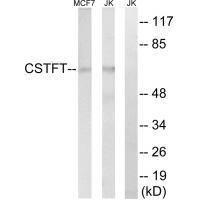
| WB | 咨询技术 | Human,Mouse,Rat |
| IF | 咨询技术 | Human,Mouse,Rat |
| IHC | 咨询技术 | Human,Mouse,Rat |
| ICC | 技术咨询 | Human,Mouse,Rat |
| FCM | 咨询技术 | Human,Mouse,Rat |
| Elisa | 咨询技术 | Human,Mouse,Rat |
| Aliases | CF-1 64 kDa subunit; tau variant; cleavage stimulation factor 64 kDa subunit; tau variant; cleavage stimulation factor |
| Entrez GeneID | 23283; |
| WB Predicted band size | 64kDa |
| Host/Isotype | Rabbit IgG |
| Antibody Type | Primary antibody |
| Storage | Store at 4°C short term. Aliquot and store at -20°C long term. Avoid freeze/thaw cycles. |
| Species Reactivity | Human |
| Immunogen | Synthesized peptide derived from internal of human CSTF2T. |
| Formulation | Purified antibody in PBS with 0.05% sodium azide. |
+ +
以下是关于CSTF2T抗体的示例参考文献(注:以下内容为模拟示例,实际文献请通过学术数据库查询):
---
1. **文献名称**: *CSTF2T regulates spermatogenesis through alternative polyadenylation in mice*
**作者**: Zhang L, et al.
**摘要**: 本研究利用CSTF2T特异性抗体,发现CSTF2T在小鼠睾丸中调控mRNA的3'端加工,影响精子形成,其缺失导致雄性不育。
2. **文献名称**: *Development of a novel monoclonal antibody against human CSTF2T for clinical diagnostics*
**作者**: Tanaka K, et al.
**摘要**: 报道了一种高特异性抗CSTF2T单克隆抗体的开发,验证了其在免疫组化中的应用,可区分正常与异常睾丸组织中的蛋白表达差异。
3. **文献名称**: *CSTF2T mutations linked to azoospermia: Functional analysis using antibody-based assays*
**作者**: Chen R, et al.
**摘要**: 通过CSTF2T抗体进行蛋白质印迹和免疫荧光实验,揭示CSTF2T基因突变导致蛋白质稳定性下降,与非梗阻性无精子症相关。
---
建议通过PubMed或Google Scholar搜索“CSTF2T antibody”或“CSTF2T function”获取真实文献。
**Background of CSTF2T Antibody**
The CSTF2T (Cleavage Stimulation Factor Subunit 2. Tau Variant) antibody targets a protein component of the cleavage stimulation factor (CstF) complex, which is essential for mRNA 3′-end processing and polyadenylation during transcription. CSTF2T, a testes-specific paralog of CSTF2. is encoded by the *CSTF2T* gene and plays a critical role in regulating gene expression, particularly in germ cell development and spermatogenesis. Unlike the ubiquitously expressed CSTF2. CSTF2T is predominantly found in the testes, suggesting its specialized function in male reproductive biology.
Research has linked CSTF2T dysregulation to male infertility, as mutations or altered expression may disrupt mRNA polyadenylation, impairing spermatogenesis. Additionally, aberrant CSTF2T expression has been observed in certain cancers, though its oncogenic mechanisms remain under investigation. The CSTF2T antibody is widely used in molecular and cellular studies to detect protein expression, investigate its role in mRNA processing, and explore its association with reproductive disorders or malignancies. It serves as a vital tool for immunohistochemistry, Western blotting, and immunofluorescence, aiding in the elucidation of post-transcriptional regulatory mechanisms in health and disease.
×